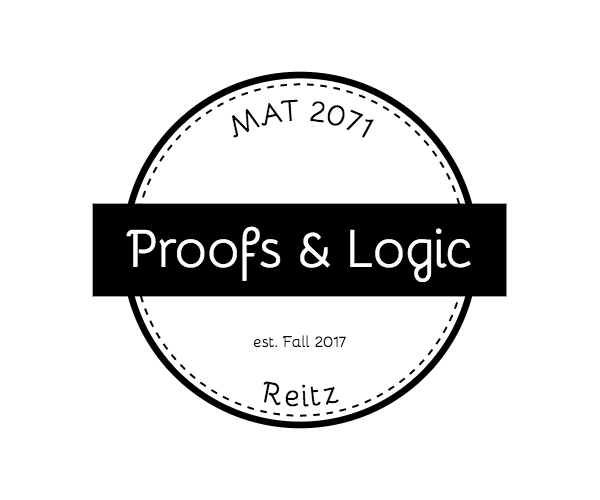If I was invited to give advice to entering students on the first day of Mat 2071 I would tell the students to always be prepare for class, and pay attention to the teacher when he or she is explaining the course. I would tell them to come in class at time, and do not miss a lot of days in order for them to keep in track. I would also advise them to always ask questions when they don’t understand something, and keep practicing the subject in class and also at home which would help them to progress and also succeed in the subject.
Handy Links
 Logic on Math StackExchange
Logic on Math StackExchange
- Where can Non-Constructibility be placed in the Analytical Hierarchy? October 18, 2024In this question I am interested in non constructible sets, which are sets that are outside $L$ which is the constructible universe. These sets exist in theories that assume axioms that state that other universes such as $V$ or $HOD$ are bigger than $L$ and so they contain sets that are not in $L$, the […]holmes
- Recursive initial segment of a nonstandard model of PA October 18, 2024Let $M$ be a countable nonstandard model of PA. We define a cut to be an initial segment that is closed under the successor function. In Kaye's Models of Peano Arithmetic, it is argued that for any nonstandard $a \in M \setminus \mathbb N$, the set $$a^{1/\mathbb N} = \{x \in M \mid x^n < […]Y. Tamer
- Does the book "Principles of Mathematical Logic" (Hilbert) contain an implicit assumption, and what might be the consequences of making this explicit? [closed] October 18, 2024Questions: (1) has any work been done on a system of logic where some "strings" (sequences of symbols) are read from left to right, and other string are read from right to left, depending on which symbols appear in these strings? (2) what might be the implications of changing logic in this way ("you are […]Matt Calhoun
- How much does "truth" matter in Tarski's undefinability of truth? October 18, 2024In many references (even quite scholastic ones),the authors present Tarski's theorem of undefinability of truth in a way that does not clarify what part of the concept of "truth" is needed in the result. This has given rise to a variety of meta-math and pseudo-math interpretations, which confuse. My question is what is the feature […]Constantine Frangakis
- Kunen's "Set Theory", Chapter 1, Exercise 22 October 18, 2024The following appears as Exercise 22, Chapter 1 in Kunen's Set Theory: An Introduction to Independence Proofs: Assume $\operatorname{Con}(\sf ZF)$. Show that there is a formula $\psi(x)$ such that $\psi$ represents $E=\lbrace n: \text{n is even} \rbrace$ but $$\text{ZF} \nvDash \forall x \in \omega(\psi(x) \vee \psi(x+\left\ulcorner 1 \right\urcorner)). $$ Here "$\psi$ represents the set of […]Nikolaus
- Mathematical proof: how to prove that if $xy$ and $x-y$ are both even, then $x$ and $y$ are both even for integers $x$ and $y$ October 18, 2024I saw this question was already previously posted, but I didn't really understand the replies to the question, so I'm asking it again. Prove that if $xy$ and $x-y$ are both even, then $x$ and $y$ are both even for integers $x$ and $y$. There is no specific method of proof that the question asks […]sophie
- Examples of bounded EM blueprints? October 18, 2024Following Jech's notation, for each Ehrenfeucht-Mostowski blueprint $\Sigma$ there is up to isomorphism a unique model with $\alpha$ many indiscernibles whose Skolem hull is equal to the whole model, and we call this the $(\Sigma,\alpha)$-model. $0^\sharp$ is the unique EM blueprint $\Sigma$ that satisfies: every $(\Sigma,\alpha)$-model is well-founded; for any limit $\alpha$, the indiscernibles of […]Lxm
- Real category with addition as coproduct and multiplication as product [duplicate] October 17, 2024Is there a category with objects as real numbers such that the coproduct/product of two objects is their addition/multiplication of them. I tried to build one myself, imagining a special transitive binary relation on the reals. I'm starting conjecturing that maybe $\wedge$ is not the right composition of relations as morphisms. Thanks in advance for […]Giulio Caflisch
- Understanding an elementary set theory proof (Halmos again) October 17, 2024In Section (chapter) 4, Halmos encourages the reader to prove several elementary theorems including: $$A \cap \emptyset = \emptyset $$ from the definition of union and the axioms of extensionality and specification. Similar proofs for union. In my proof attempt (which I “checked” against what ChatGPT or CoPilot could deliver) I wrote this: Given (set) […]Clive Long
- Is there a model of $\mathsf{ZFC{-}FA}{+}\exists\{x:x\in x\}$ s. t. $\{x:x\in x\}$ is not empty and does not belong to itself? October 17, 2024Inspired by the answer to this question, is there a model of $\mathsf{ZFC{-}FA}{+}\exists\{x:x\in x\}$ such that $\{x:x\in x\}$ is not empty and does not belong to itself? Some context There is a minor debate in philosophy about the status of so-called hypodoxes, which are usually only defined by instances. Two major instances are: co-Russell's set […]Timotej Šujan




Hi Miralia,
Thanks for the response – that’s great. I’d prefer that you leave it as a comment on the OpenLab #1 assignment, here:
https://openlab.citytech.cuny.edu/2017-fall-mat-2071-reitz/?p=292
(scroll to the bottom and you’ll see that you can leave a reply – just copy/paste it in there). This will ensure that it gets counted correctly for your grade.
Best,
Prof. Reitz